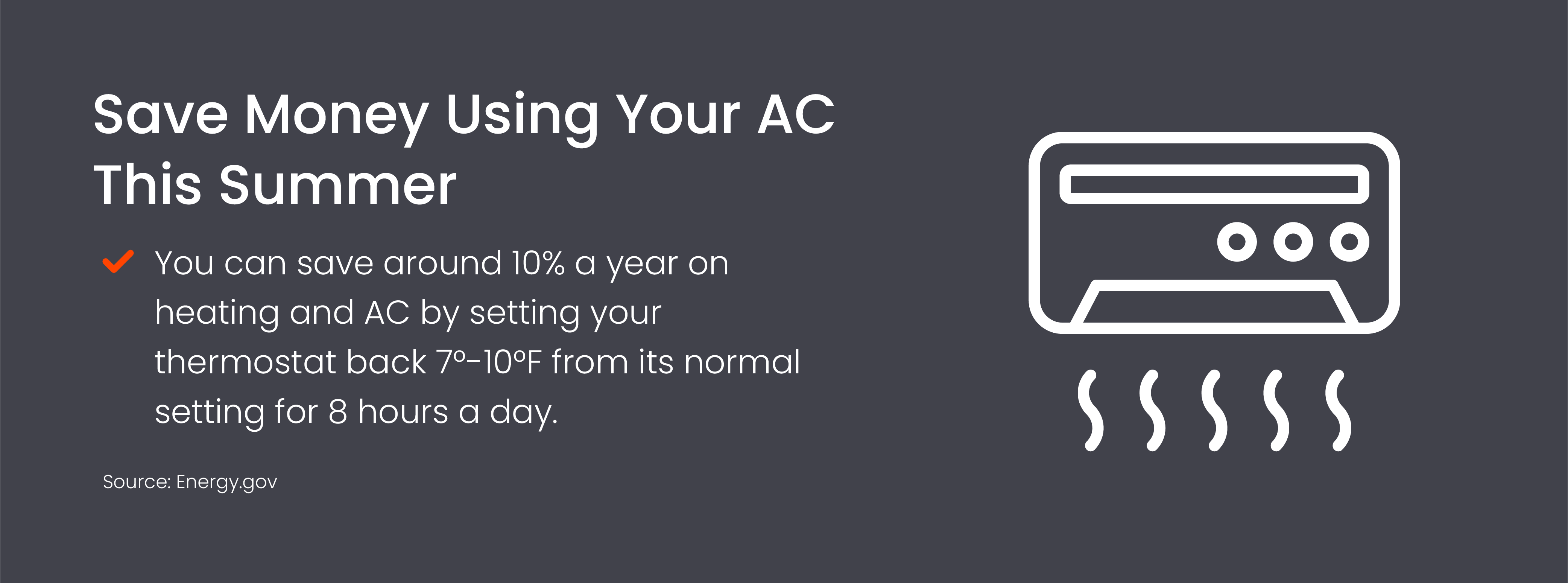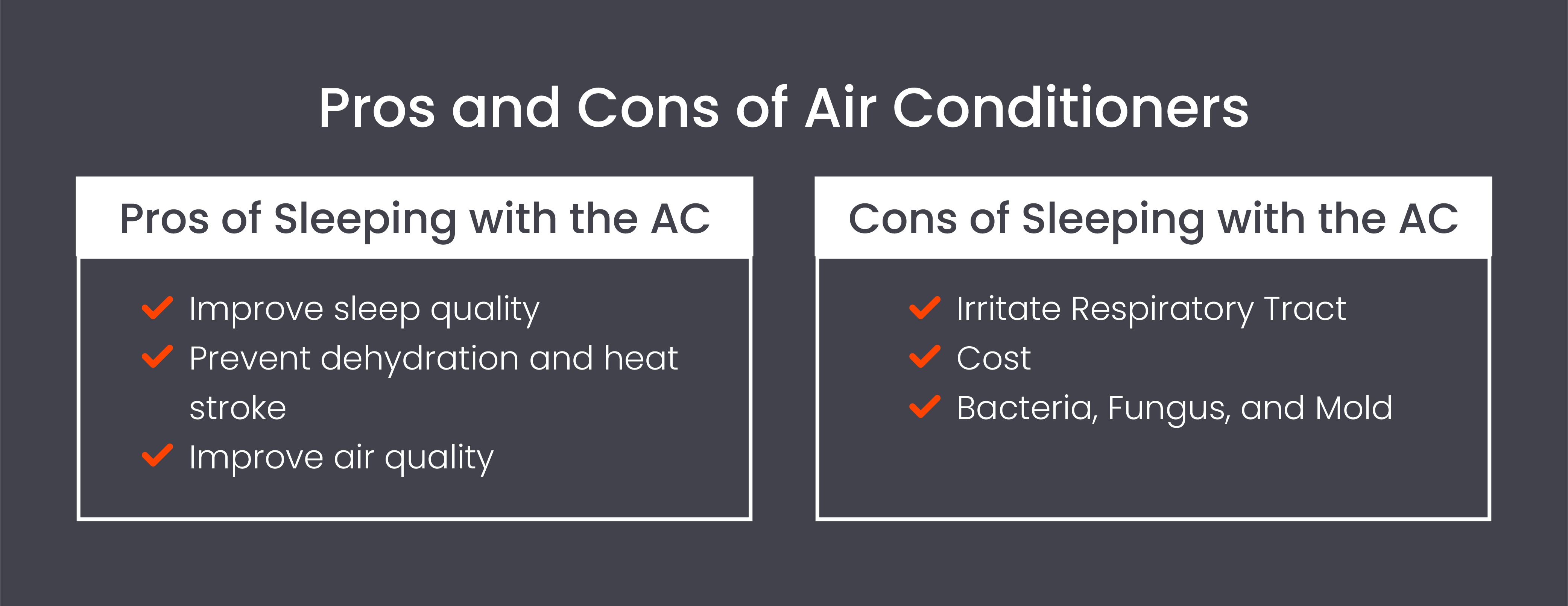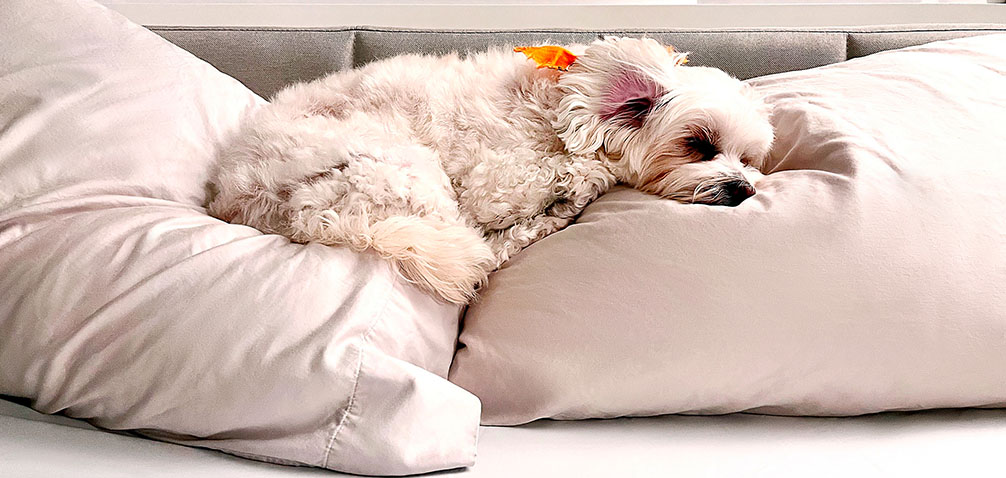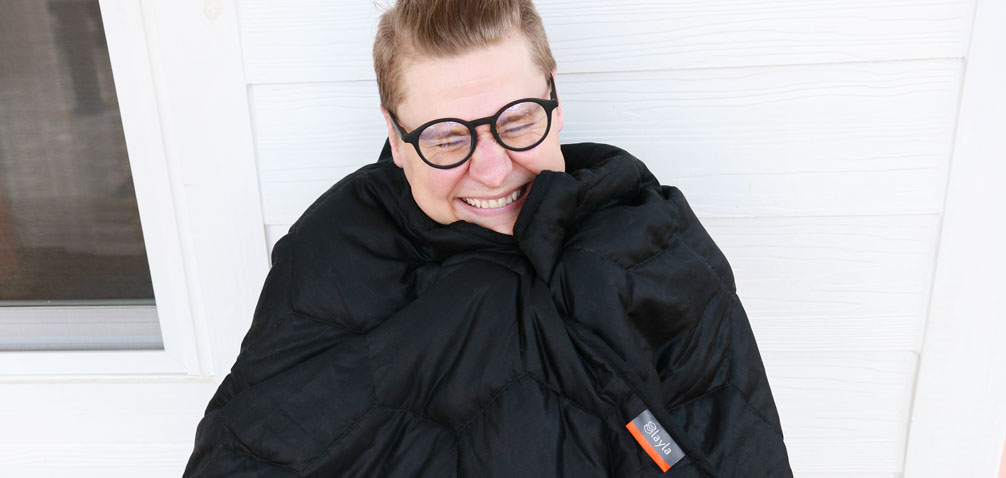Most people sleep with the AC on in the summer, but if you’re wondering what the best temperature for sleep is, you may get different answers depending on who you ask. For example, some people may try to save money by putting the AC on a higher setting or even off at night, while some may choose to set a cooler nighttime temperature to promote better sleep. So, what is the best AC temperature for sleeping in summer? Let’s find out below.
- What Temperature Should I Set My AC at Night?
- What Temperature Should I Set My AC at to Save Money?
- How to Troubleshoot Your Air Conditioner
- Pros and Cons of Sleeping with the AC
- Additional Tips to Sleep Cool
- Sleep Cool with Layla Sleep
What Temperature Should I Set My AC at Night?
The best AC temperature for sleeping in the summer is between 60 and 67 degrees. However, it’s also a matter of personal preference. Using the AC in the summer when you’re sleeping uses up a lot of energy, which translates to a higher electrical bill at the end of the month. However, you must choose whether it’s worth paying more on your utility bill to get quality sleep to be productive and energized during those busy summer days.

What Temperature Should I Set My AC at to Save Money?
Since air conditioners use up a lot of energy, and more energy usage results in a larger electrical bill, you might be wondering what the ideal temperature is that will allow you to save money in the summer. Consumer Reports states that the Department of Energy and Energy Star recommends that you find a temperature that allows you to be comfortable when you’re awake at home. However, Energy Star also suggests increasing the temperature by four degrees while you sleep. Unfortunately, if your ideal temperature is 70 degrees when you’re awake, you might find it difficult to fall asleep and stay asleep in a room that’s 4 degrees warmer.

Meanwhile, Energy Saver, the Department of Energy’s consumer resource, states that you can save up to 10% each year by raising your home’s temperature seven to ten degrees for up to eight hours a day from its normal setting. They also state that when you keep your thermostat at a higher temperature, it slows the flow of heat that enters your home, so your AC won’t have to work as hard to cool your home, ultimately saving you money.
How to Troubleshoot Your Air Conditioner
Air conditioners are forced to work incredibly hard during the hot summer months and may not always reach the temperature you set them at. For example, on extremely hot days, you may notice your air conditioner is on, but your thermostat isn’t reading the temperature you set it at. This is a sign your air conditioner might be working hard and is simply unable to cool your home to your ideal temperature, or it could signal a problem with the unit. Here are a few ways to troubleshoot your air conditioner if it’s not working properly.

- Check your AC’s age: Air conditioners should be replaced about every fifteen years. If your AC isn’t reaching your set temperature, consider hiring a professional to repair or replace the unit. It’s best to check that your AC is working properly before summer because repair companies get busy as summer starts and more homes begin running into this problem.
- Clean your filters: AC air filters need to be replaced yearly because they can get clogged with dust and debris. If you’ve recently changed your filters, consider checking and cleaning them to ensure they’re able to allow for proper airflow.
- Inspect your outdoor AC unit: Your air conditioning unit must exhaust heat through vents. However, if your grass or lawn has started to take over the unit, it might need to be cleaned and better maintained to allow for proper airflow.
- Check your thermostat: The location of your thermostat could impact your air conditioner’s ability to cool your home in the summer. For example, if it’s near a heating source or a sunny window, it could impact the readings and make your system unable to react to changes in temperature. Wires can also become loose or dirty over time, so you may need to clean your thermostat gently to ensure it’s working properly.
- Check the seals on window units: If you use a window unit, it’s possible your home isn’t reaching the set temperature because the seals around the unit are allowing warm air to enter the home. Your seals must be tight. If they aren’t, consider insulating around the seals and window to keep warm air at bay.
If, after all this, your home still isn’t reaching your ideal temperature, call a professional who can diagnose the issue. In some cases, units may not be able to reach your ideal temperature. For example, if it’s 95 degrees outside, it may be difficult for your air conditioner to make your entire home 60 degrees.
Pros and Cons of Sleeping with the AC
Sleeping with the AC comes with many pros and cons. Of course, you should be comfortable when you get to sleep, but not at the expense of your wallet. Check out these pros and cons of sleeping with the air conditioner to determine if it’s right for you.
Pros of Sleeping with the AC
- Improve sleep quality: Sleeping with the AC allows your body to reach a lower internal temperature, which it needs to fall asleep and stay asleep comfortably.
- Prevent dehydration and heat stroke: Sleeping in a room that’s too hot can cause you to sweat and become dehydrated, which can lead to heat stroke in extreme cases.
- Improve air quality: Air conditioners have filters to filter out dust particles and allergens that can affect your ability to breathe properly and may cause allergies. Keeping the AC on at night keeps the air flowing through the filter to reduce allergens.

Cons of Sleeping with the AC
- Irritate respiratory tract: Air conditioners remove humidity from a room. However, this can cause the air conditioner to blow out air that can irritate your respiratory tract and cause dry nose, mouth, throat, and even skin.
- Cost: Sleeping with the air conditioning on when you cannot truly enjoy it can cost you more on your monthly utility bill. Electricity is more expensive in the summer, so it may be best to keep your AC off on cooler nights.
- Bacteria, fungus, and mold: If there is mold, fungus, or bacteria in your air conditioning unit, it can get pushed into your air, making it dangerous to breathe with the AC on.
Additional Tips to Sleep Cool
Running the AC at night is just one method for how to keep your room cool. However, there are other ways to stay cool, allowing you to save on your electric bill during the summer. Here are some tips to beat the heat this summer:
- Sleep naked: Sleeping naked can help your body stay cool throughout the night. Without an additional layer of clothing, your body can effectively regulate heat.
- Take a warm shower: Bathing in warm water before bed can help lower your body temperature because it rises in the shower and cools as soon as you get out.
- Eat smaller meals: Your body generates heat when digesting food, and the harder food is to break down, the more heat your body will generate. Heavy meals use more energy, while spicy foods can make you feel warmer. Instead, eat a light meal before bed.
- Use a frozen water bottle: Freezing a water bottle before bed gives you something to touch that’s cooling, acting as a cold compress. You can use the water bottle to keep your face and neck cool throughout the night.
- Close shades during the day: Give your air conditioner a break by keeping your shades and blinds closed during the day, so it doesn’t have to work as hard to cool your home.
- Swap your bedding: Stay cool at night by swapping thicker, warmer bedding with sheets designed to promote airflow and let your body heat escape. Bamboo and cotton sheets are ideal for summer because they’re breathable.
Sleep Cool with Layla Sleep
Many people have a difficult time falling asleep and staying asleep when their bedroom environment is too warm. Proper air circulation is key to ensuring you can sleep in a cool room and bed. Layla’s sleep hot solution can help you achieve perfect sleep no matter the temperature outside. Regular mattresses absorb heat, which makes you hotter at night. Layla’s cooling memory foam mattresses utilize copper particles that pull heat away from the body for a cool sleep.
Don’t forget to check out Layla’s cooling pillows! The Layla Kapok Pillow utilizes light, airy fibers with stressed memory foam and a breathable cover to keep your head cool while you sleep. With the Kapok Pillow, both sides are the cool side.



